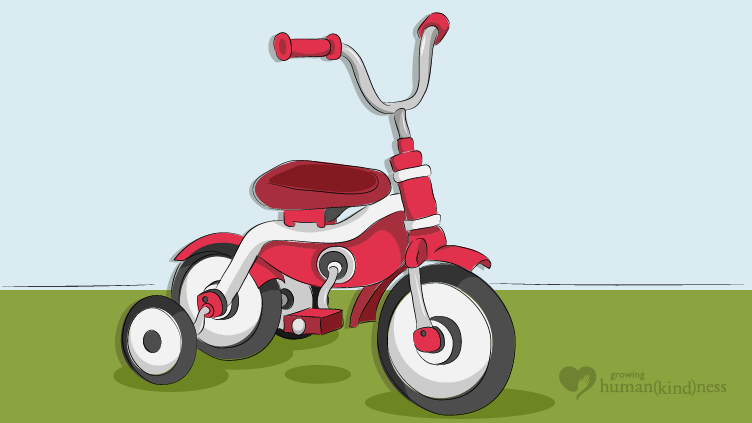The beginning of anything can be hard. If you struggle with a sugar addiction and you’re trying to change how much sugar you eat, in the beginning, it may feel difficult, uncomfortable and simply “off” because this new way of eating feels so unfamiliar.
During times of transition, it helps to give yourself lots of support and scaffolding. I liken this to training wheels. In the same way that training wheels can help a child learn how to ride a bike, training wheels – support and structure – can help you change your habits with sugar.
But there’s also a paradox at work here. While training wheels are helpful in the beginning of the journey, those same supports can feel stifling later on. At some point, a child needs to remove the training wheels in order to bike with greater freedom. Similarly, you’ll reach a point with sugar where the old constraints are stifling, not supportive.
Let’s make this concrete with an example. Let’s say that in the beginning of your journey out of sugar, going to certain restaurants or events where sugar is prominent were too triggering for you – they led to cravings that had you in over your head. So you stayed away from those restaurants or parties until you felt more grounded and more confident in your ability to care for the cravings. This is an example of giving yourself training wheels and being emotionally honest about your limits.
Over time, though, you’re going to want to slowly release that scaffolding. You don’t want to hide from parties forever – you want to have the freedom to both honor how you eat while also enjoying the company of friends or loved ones. To make that scaffolding permanent – I can’t go places where there’s sugar – would stifle your joy and your life.
Where most people get stuck is this: as they slowly release their training wheels, they find themselves in situations where they face their growing edge. They may eat sugar, they may feel triggered, they may feel like they’ve gone backwards. They see this slip as a sign of failure and retreat back to their supports, rather than seeing it for what it truly is: a sign of growth. You’re growing out of your old supports and you’re testing your wings. Yes, there will be some trial and error as you grow. Yes, you will make mistakes. That’s okay. It’s part of the journey.
I encourage you to invite this process and to normalize it, rather than fearing it or blaming yourself when it occurs. Plan for it. Count on it. Name it: this is growth.
The journey of growth – and flight – always involves being stretched, making mistakes, and, too, a chance to soar.
Wanting more hands on help?
If you struggle with sugar binges, sugar cravings, or a love/hate relationship with sugar, you may be interested in this free sugar 101 video course, where you’ll learn more about healing a sugar addiction.
Read a transcript
“When you first start giving up sugar it’s like you’re in a little bit of a bubble and you’re trying to make it as easy as possible. But it’s like a child that is riding a bike with training wheels. At some point they need to take the training wheels off in order to experience the fullness of joy that comes from riding a bike. And yet, once you take the training wheels off, there’s a little bit more of a chance of crashing, right? And there’s a little bit more risk.
For yourself in the beginning, you’re going to have some training wheels around sugar. And that’s wise, because in the beginning you might need that extra support. It’s the same reason that you might stake a tomato plant when it’s young. Or its the same reason that if your gardener, why you might start your seeds indoors to give that that little bit of that bubble before you go and plant them outside where there could be hail and where there can be rain and weather and storms.
There’s a wisdom in that and there’s a paradox of if we just keep the seeds indoors and if we just keep the training wheels on we can’t grow into the fullness that we are. So, part of your healing journey the sugar is going to entail times when you take off the training wheels and that you’re in situations that are little bit more challenging.
Just because you “fail” at that, meaning that you find yourself in a more challenging situation and you find yourself eating more sugar than you’d like, don’t look at that as failure, look at that as growth of, “I am integrating something that I haven’t integrated before. This is a trickier situation than I’m used to.”
It’s like teaching a child counting, and then moving them up to algebra. They’re going to make some mistakes when they first learn algebra because it’s new and it’s new territory and it’s more challenging and the same is true for you.”
